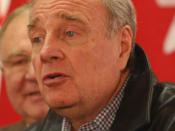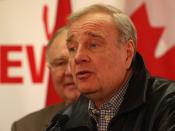An honest politician is one who, when he is bought, will stay bought.
- Simon CameronIntroduction & BackgroundAfter the 1980 referendum, which saw a narrow victory for the federalist side, Québec sovereignty was considered to be an almost dead issue and placed on the back burner. However, events in the following years would lead to the resurgence of the sovereigntist cause. In 1982, the Canadian Constitution was patriated, though the Québec government did not sign onto this document. While the constitution still applied to Quebec, efforts were made in future years to amend the constitution to have it be accepted by the defiant Province. But, both the Meech Lake and Charlottetown Accords failed at getting the job done.
A decade later in 1990, Lucien Bouchard, then a federal Progressive Conservative cabinet minister, led a coalition of Liberal and Progressive Conservative members of parliament to form a new federal party devoted to separatism, it would be called the Bloc Québécois.
In 1993, Quebec elected 54 Bloc MPs to parliament, which made it the second largest party during that session and gave it the role of the official opposition. In Quebec, the 1994 provincial election brought the Parti Québécois, led by Jacques Parizeau, into power. The party had promised to hold a referendum on sovereignty, and soon after Mr. Parizeau's win, he delivered on his party's promise. The 1995 Quebec referendum took place on October 30th, and the motion to pursue Quebec's independence was defeated by an extremely small margin; 50.58% voting "No" to 49.42% voting "Yes". Though the people of Québec voted, by the narrowest of margins, to remain Canadians, the referendum provoked questions about Canadian identity and Quebec's place in Confederation.
Shortly after that referendum, the federal government began a pro-federalism advertising campaign to boost its profile in the province...


